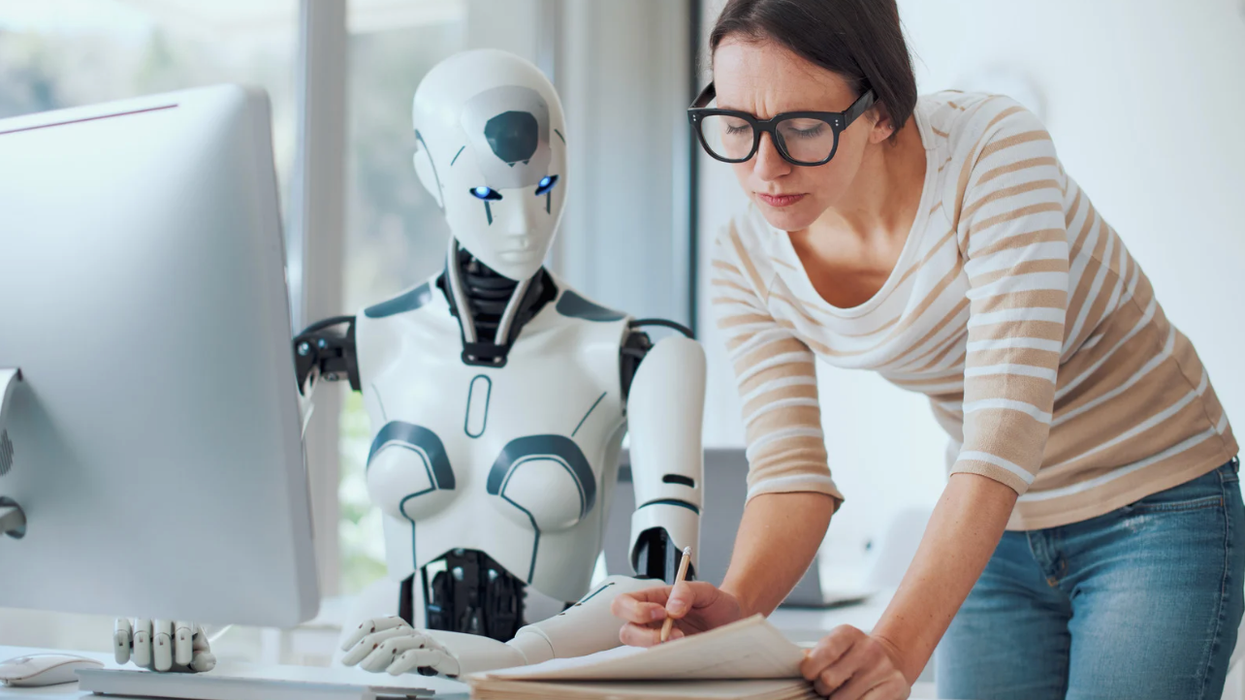Artificial intelligence has been marketed to the general public for years now as a means to write up stories, lists, papers, and the like along with generating images for prompts. As the technology continues to learn from previous manmade art, written work, and history as a whole, many are wondering if humans can keep up with it. Well, while in many fashions A.I. is being set up to compete with humanity, there is one thing that the human brain is superior to A.I. every time no matter what task is being asked: energy efficiency.
A published study has shown that whether it is coming up with something to write, draw, or calculate, artificial intelligence requires significantly more energy to come up with results than a human brain according to Switzerland’s Blue Brain Project. To put it in terms of numbers, the human brain processes thought with only 12 watts of power, but A.I. simulating a human brain’s thought process would take around 2.7 billion watts of power. In short, it takes the human brain less power to light up a lightbulb to process a thought while it takes A.I. the power of 18 million laptop processors to simulate the same thing. This makes the organic brain millions of times more energy efficient.
@professorcasey AI energy consumption. More on the potential environmental cost of AI and other electricity-hungry tech. #aiethics #sustainability
While the promise of A.I. has yet to be perfected, it has already cost a lot of energy to build and train. For example, training OpenA.I.’s ChatGPT3 program required the same amount of electricity that could power up 130 American homes for a year. A 2023 MIT report found that the power to generate a single A.I. image could fully charge the average cell phone. TechRadar found that a five-second-long video generated by A.I. uses as much energy as running a microwave for an hour or more.
@thechainsawdotcom AI consumes an insane amount of electricity per year. #ai #environment #tech #science
It’s not just electric power either, as a data center for A.I. consumes the same amount of water as 4,200 Americans each day. Much of that water often comes from areas in the country that need it the most. Regardless of personal feelings or morality regarding artificial intelligence, unless certain changes and innovations are made, it’s unlikely that A.I. can approach the computing power of a human brain with anywhere close to the same amount of power or water consumption.
There is one thing that A.I. tends to be quicker and more efficient in doing compared to the human brain—calculation. A.I. has been proven to help scientists and doctors in various fields map out scenarios in simulations and calculate data faster than supercomputers. However, it’s not without critics, as A.I. could be slow to learn initially, make mistakes, and overall needs a human to check their work for accuracy.
Another thing that the human brain has an advantage over A.I. is multitasking. As of this writing, A.I. can process certain thought-related tasks one at a time, whereas human brains are able to perform several thought tasks simultaneously. It's how you're able to drive a car safely while singing a song at the same time while remembering what items to get from the grocery store to bake a cake. This A.I. limitation could be curbed over time and invention, but that's only if there is enough processing power available for it to achieve it.
@erikabarkernyc #aiexplained #artificialintelligence #artificialintelligencetok #howaiworks #howchatgptworks #howthebrainworks #aivshumans #techtok #techexplained #machinelearningexplained #futuretechnology #futuretech #artificialintelligencetechnology #ai
So does A.I. compete with the human brain? Well, if it’s based on energy efficiency, water use, and cost, the answer is a resounding “no.” However, if human brains wish to tinker and come up with different options, uses, or upgrades to digital “brains” to make them more efficient in terms of both energy consumption and output, only time will tell.




















 Winter weather.
Winter weather. 

 In the past two years, two malaria vaccines have become available for babies starting at 5 months of age.
In the past two years, two malaria vaccines have become available for babies starting at 5 months of age. By exploiting vulnerabilities in the malaria parasite’s defense system, researchers hope to develop a treatment that blocks the parasite from entering cells.
By exploiting vulnerabilities in the malaria parasite’s defense system, researchers hope to develop a treatment that blocks the parasite from entering cells. Created with
Created with 
 Tasks that stretch your brain just beyond its comfort zone, such as knitting and crocheting, can improve cognitive abilities over your lifespan – and doing them in a group setting brings an additional bonus for overall health.
Tasks that stretch your brain just beyond its comfort zone, such as knitting and crocheting, can improve cognitive abilities over your lifespan – and doing them in a group setting brings an additional bonus for overall health. Overdoing any task, whether it be weight training or sitting at the computer for too long, can overtax the muscles as well as the brain.
Overdoing any task, whether it be weight training or sitting at the computer for too long, can overtax the muscles as well as the brain.

 Amoxicillin is a commonly prescribed broad-spectrum antibiotic.
Amoxicillin is a commonly prescribed broad-spectrum antibiotic.  Chart: The Conversation, CC-BY-ND
Chart: The Conversation, CC-BY-ND